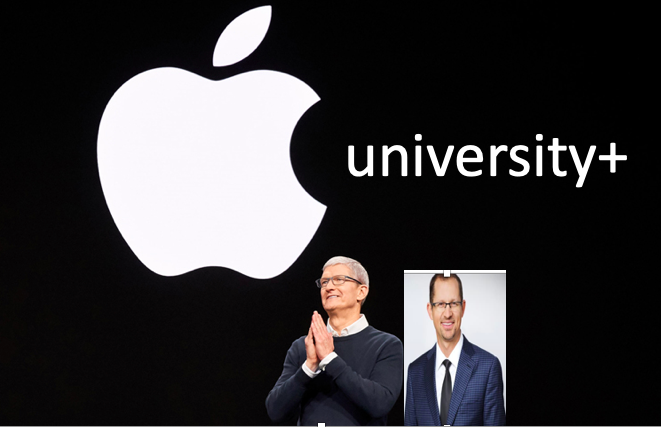You have /5 articles left.
Sign up for a free account or log in.

The March 25th Apple event did not include the surprise announcement of Apple’s strategic pivot into a provider of higher education, Apple University+.
In addition to the unveiling of Apple’s new paid news service (Apple News+), subscription gaming platform (Apple Arcade) and streaming on-demand video subscription service (Apple TV+), Apple also announced (not really) its foray into online education program management and alternative credentialing (Apple University+).
The Apple University+ section of the keynote event did not kick off with the CEO of Coursera, Jeff Maggioncalda, joining Tim Cook on stage to reveal that Apple has acquired the open online learning startup.
Cook and Maggioncalda did not herald the combination of Coursera and Apple as a game changer in higher education.
What is not Apple University+?
According to Cook and Maggioncalda, who will not be assuming the new title of president of Apple University+, the new division will not be built around the following principles:
Not Affordable Quality at Scale:
Apple University+ will not be dedicated to creating a platform that can offer global learners high-quality educational programs, including accredited degree programs, at dramatically lower costs.
What Tim Cook did not say in his portion of the keynote about Apple University+ was, “Higher education today is broken. It is too expensive. Students graduate with too much debt. Or worse, fail to graduate, while still owing thousands of dollars. Apple University+ is committed to redesigning learning and credentialing.”
According to no information not provided by Apple, the company will not invest tens of millions of dollars into new educational content and software and hardware to create learning environments that enable mass personalization. Coursera’s online platform will not be married to Apple’s investments in artificial intelligence.
Not Mobile Learning:
To achieve premium quality online learning experiences at scale, and to create a new set of alternative and traditional credentials that will have value in the marketplace, Apple will not be re-orienting all of Coursera’s (now University+) platforms and courses for mobile.
What was never said in the Apple Keynote was that moving to mobile was a necessary step to globally scale digital learning. Not according to Cook, Apple University+ will invest in an integrated approach to learning platform development that brings together hardware, software, and content. Cook never said that,
“Creating immersive and rigorous learning environments for mobile, particularly those that are credit-bearing and result in certificates and credentials that employers will recognize, is a wicked problem. At Apple, we don’t believe that what is necessary is to approach this challenge with a clean slate - and then to combine all that we know in creating hardware, software, and content that blends seamlessly to the world of education.”
Cook did not point out that the price of hardware is vanishingly small when compared to tuition costs, and that the plan to provide every Apple University+ learner with an iOS device will have little impact on the costs of the program.
No Lifelong Credentialing:
The third pillar that Apple University+ is not building its new long-term investment in building an education company is lifelong learning. Cook never said that “The higher education model that we have today of separating education from employment, and of having long gaps between earning new educational credentials during one's career, no longer matches what either people or companies need.”
The model for Apple University+ will not be different. What Apple is not doing is moving to a tuition model that more closely resembles a subscription than a for-credit payment. Learners within the Apple University+ ecosystem will not be able to continually enroll in courses and programs that result in alternative credentials (that stack up to traditional degrees).
Cook never pointed out that by following a strategy that combines hardware, software, and content - and by building the credentialing program around personalization at scale and mobile learning - that Apple University+ will be able to offer a subscription model for learning (and degrees) comparable to the cost of cell phone plan. Cook did not say “At Apple, we are committed to not taking what has been scarce and expensive - an educational credential that allows someone to get a job or get promoted - into an opportunity that is abundant and affordable.”
There has been no reaction to Apple University+ as this is not a real thing, but the general feeling of the higher ed community is one of skepticism that Apple will be able to create low-cost credentials at scale that are valued by both students and employers. When reminded of the initial skepticism surrounding the first iPhone (“There's no chance that the iPhone is going to get any significant market share. No chance.” Steve Ballmer 2007), most higher education experts doubled down on their opinion that the Apple/Coursera University+ initiative has “no chance” exerting a significant impact in the postsecondary market.
What don’t you think about Apple University+?




